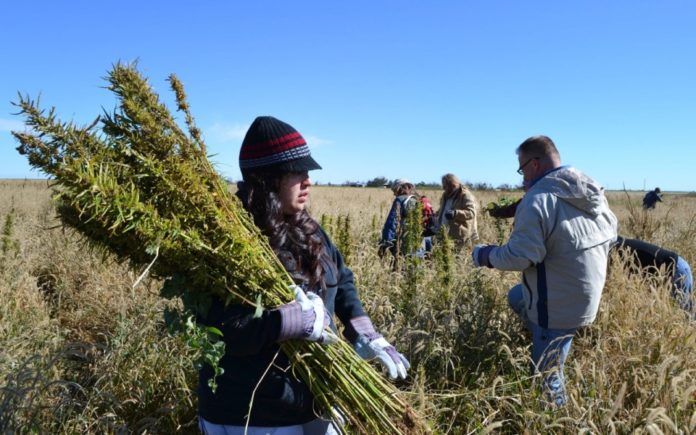
Hemp is restoring the agricultural economy, dealing with climate change, and is being used as one of the greatest medicines on the planet. Says who? In Colorado farmer Ryan Loflin’s words:
“Hemp takes half the water that wheat does, and provides four times the income. Hemp is going to revive farming families in the climate change era.”
— trutherbotyellow (@trutherbotyelow) March 14, 2016
Industrial hemp was once a dominant crop on the American landscape. The Declaration of Independence was drafted on hemp paper, and even the finest Bible paper today remains hemp-based. Henry Ford even built a prototype car from biocomposite materials, using agricultural fiber such as hemp. The herb was (and still is) used to make fabric, food, fuel, plastics, construction material, insulation, paper and auto parts.
“#Hemp is of first necessity to the wealth and protection of the country” -Thomas Jefferson #Marijuanomics #America pic.twitter.com/LOiFvj4YRA
— Marijuanomics (@Marijuanomics) March 23, 2016
All that changed in 1937 when the Marijuana Tax Act was passed in the United States, defining hemp along with marijuana as a narcotic; even though it contains nearly none of the chemical that gives marijuana its intoxicating agent — less than 0.3% THC to be precise. Hemp cultivation was formally prohibited by the Controlled Substances Act of 1970, which clubbed cannabis alongside heroin and LSD as a Schedule 1 substance, a category defined as “drugs with a high potential for abuse.”
However, a sustained resurgence of interest in allowing commercial cultivation of industrial hemp by a diverse, but increasingly politically influential and unified group of businesses, farmers, nutritionists, activists, and green consumers, began in the United States in the early 1990s. The US Farm Bill – signed into law in 2014 – defined industrial hemp as distinct from marijuana, allowing universities and state agriculture departments to begin cultivating hemp for research purposes in states where it was legal.
This is how you can make America great again. Please support American grown/family owned #Hemp and #CBD producers. https://t.co/9Mg69TKd6U
— IwantmyCBD (@IwantmyCBD) March 28, 2016
Thus far in the United States, California, Colorado, Connecticut, Delaware, Hawaii, Illinois, Indiana, Kentucky, Maine, Maryland, Michigan, Minnesota, Missouri, Montana, Nebraska, Nevada, New York, North Carolina, North Dakota, Oregon, South Carolina, Tennessee, Utah, Vermont, Washington, West Virginia, and Virginia have adopted pro-hemp laws.
This March, members of the Pennsylvania Senate voted 49-0, a unanimous vote, in favor of industrial hemp. Bruce Perlowin, CEO of Hemp, Inc., noted:
“Industrial hemp is making its way back… Pennsylvania is soon to be yet another state to become part of a new clean, green agricultural and industrial American revolution that, based on the economics and products derived from hemp, is set to be the next billion dollar industry.”
Hemp’s economic potential is too big to ignore. Canada is raking in $1 billion a year on the production and sale of hemp. A 2015 Congressional Research Service Report estimates that the current US market for hemp products is $580 million annually; yet almost all of the hemp used for food, t-shirts and building applications is imported from Canada, Europe and China.
Hemp, Inc. observes:
“While legalizing industrial hemp is economically advantageous for America, the legalization of medical marijuana seems to be equally as strong economically. The cannabis industry can reach upwards of 22 billion dollars by the year 2020 that could result from the compounded effects of legalization of marijuana throughout the nation. As the industry becomes “more and more palatable to communities around the nation”, job growth and tax revenues inevitably increase.”
FYI: Before the hemp prohibition of 1937, 30% of Americans were farming [today barely 1% Americans are farming hemp]; the US hemp was among the best in the world. The US Department of Agriculture last recorded an industrial hemp crop in the late 1950s. At the 1943 peak, more than 150 million pounds were harvested on 146,200 acres.
Despite changes in the federal policy, American farmers still can’t produce and cultivate industrial hemp. It is still considered a narcotic and farmers need to get permission from the US Drug Enforcement Administration to grow hemp, regardless of whether they have a state-issued permit. In 2014, the DEA even seized 250 pounds of hemp seed in Kentucky — the seeds, imported from Italy, were destined for research projects.
In January of 2015, the Industrial Hemp Farming Act was introduced in the House and Senate, H.R. 525 and S. 134. If passed, all current restrictions on the cultivation of industrial hemp would be removed, along with its classification as a Schedule 1 controlled substance.
This article (Why Tte United States must Decriminalize Industrial Hemp) is a free and open source. You have permission to republish this article under a Creative Commons license with attribution to the author and AnonHQ.com.




